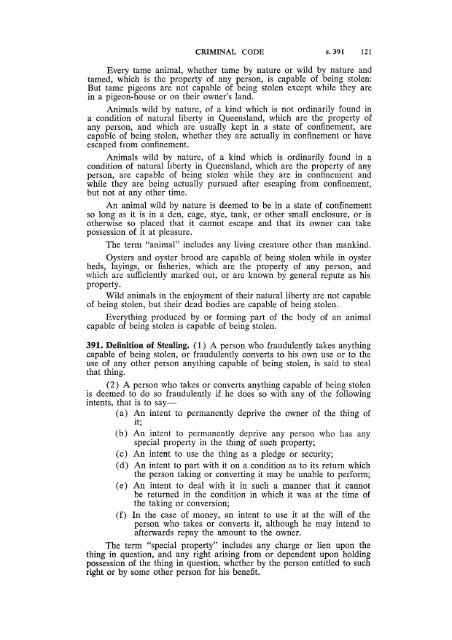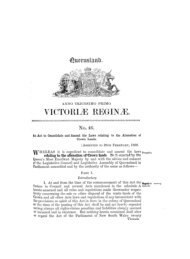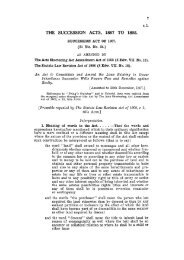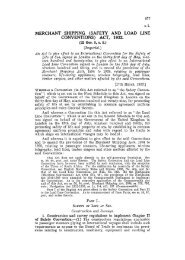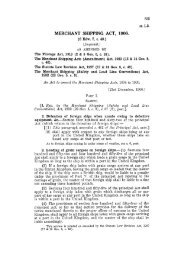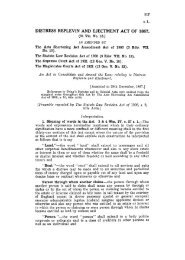- Page 2 and 3:
Crown Copyright is Reserved QUEENSL
- Page 4 and 5:
THE IMINAL C DE ACT, 1899 63 Vic. N
- Page 6 and 7:
CRIMINAL CODE ACT, 1899 3 An Act to
- Page 8 and 9:
CRIMINAL CODE 5 Kingdom which is ex
- Page 10 and 11:
CRIMINAL CODE 7 PART 11-OFFENCES AG
- Page 12 and 13:
Section 127. 128. 129. 130. 131. 13
- Page 14 and 15:
CRIMINAL CODE 11 aAPTER XXIII-NUISA
- Page 16 and 17:
CRIMINAL CODE 13 CHAPTER XXIX-conti
- Page 18 and 19:
CRIMINAL CODE 15 CHAPTER XXXVIII-ST
- Page 20 and 21:
Section CRIMINAL CODE 17 CHAPTER XL
- Page 22 and 23:
CRIMINAL CODE 19 Section CHAPTER LV
- Page 24 and 25:
CRIMINAL CODE 21 CHAPTER LXIII-cont
- Page 26 and 27:
CRIMINAL CODE s.l 23 PART I-INTRODU
- Page 28 and 29:
CRIMINAL CODE s.1 25 The term “pe
- Page 30 and 31:
CRIMINAL CODE SS. 5-8 27 It is imma
- Page 32 and 33:
CRIMINAL CODE ss. 13.14 29 an offen
- Page 34 and 35:
CRIMINAL CODE s. 19 31 19. C~nstruc
- Page 36 and 37:
CRIMINAL CODE s.20 33 before the da
- Page 38 and 39:
CRIMINAL CODE ss.27-31 35 ~ ~ A per
- Page 40 and 41:
CRIMINAL CODE fS. 36,37 37 But neit
- Page 42 and 43:
CRIMINAL CODE SS. 42-45 39 is guilt
- Page 44 and 45:
CRIMINAL CODE ss.49-51 41 (2) Takes
- Page 46 and 47:
CRIMINAL CODE SS. 56-56B 43 56. Dis
- Page 48 and 49:
CRTMINAL CODE ss. 60-61 45 member,
- Page 50 and 51:
CRIMINAL CODE s5.65-59 449' A prose
- Page 52 and 53:
CRIMINAL CODE ~3.78~79 49 (c) Being
- Page 54 and 55:
CRIMINAL CODE SS. 81-84 51 I. ~~~~~
- Page 56 and 57:
CRIMINAL CODE SS. 90-95 53 ers wit
- Page 58 and 59:
CRIMINAL CODE $Ss.99-P83 55 e ~ ~ A
- Page 60 and 61:
CRIMINAL CODE ss. 106, 107 57 (5) B
- Page 62 and 63:
CRIMINAL CODE ss. P12-PP§ 59 C~FS
- Page 64 and 65:
CRIMINAL CODE SS. 119-126 61 (2) Co
- Page 66 and 67:
CRIMINAL CODE SS. 126-131 63 126. F
- Page 68 and 69:
CRIMINAL CODE SS. 136-141 65 (2) Pu
- Page 70 and 71:
CRIMINAL CODE SS. 148-151 67 148. O
- Page 72 and 73:
CRIMINAL CODE SS. 154-157 69 654. U
- Page 74 and 75: CRIMINAL CODE SS. 163-168 71 liable
- Page 76 and 77: CRIMINAL CODE ss. 175-878 73 a Any
- Page 78 and 79: CRIMINAL CODE SS. 180-183 75 (3) Wi
- Page 80 and 81: CRIMINAL CODE ss. 189-193 77 9. Ere
- Page 82 and 83: CRIMINAL CODE SS. 200-206 79 200. R
- Page 84 and 85: CRIMINAL CODE SS. 212-284 81 en^ of
- Page 86 and 87: CRIMINAL CODE SS. 218-220 83 A pers
- Page 88 and 89: CRIMINAL CODE SS. 225-229 85 d, Any
- Page 90 and 91: CRIMINAL CODE SS. 231-233 87 or the
- Page 92 and 93: CRlMINAL CODE SS. 237-291 89 CHAPTE
- Page 94 and 95: CRIMINAL CODE SS. 247-253 91 247. E
- Page 96 and 97: CRIMINAL CODE SS. 260-264 93 When a
- Page 98 and 99: CRIMINAL CODE SS. 290-274 95 Whethe
- Page 100 and 101: CRIMINAL CODE ~s.2831-288 97 288, D
- Page 102 and 103: CRIMINAL CODE SS. 299-302 99 other
- Page 104 and 105: CRIMINAL CODE SS.309-317 10 1 rder.
- Page 106 and 107: CRIMINAL CODE SB. 319-323 103 ~ n S
- Page 108 and 109: CRIMINAL CODE ss. 3288,328~ 105 imp
- Page 110 and 111: CRIMINAL CODE BS, 333338~ 107 333.
- Page 112 and 113: If the justices are of opinion that
- Page 114 and 115: 351. Abductb. Any person who- (1) W
- Page 116 and 117: CRIMINAL CODB SS. 358-361 113 awfnl
- Page 118 and 119: CRIMINAL CODE SS. 364-371 115 344.
- Page 120 and 121: CRIMINAL CODE ss. 375,376 117 The t
- Page 122 and 123: CRIMINAL CODE SS. 379-384 119 378.
- Page 126 and 127: CRIMINAL CODE SS. 394-3538 123 trea
- Page 128 and 129: CRIMINAL CODE SS. 399-406 125 XI. ~
- Page 130 and 131: CRIMINAL CODE §S. 408~-410 127 is
- Page 132 and 133: CRIMINAL CODE ss. 416,417 129 with
- Page 134 and 135: CRIMINAL CODE §S. 420-425 13 1 If
- Page 136 and 137: CRIMINAL CODE SS. 424~438 133 427A*
- Page 138 and 139: CRIMINAL CODE ss. 435,436 135 tlie
- Page 140 and 141: CRIMINAL CODE SS. 440-442~ 137 embe
- Page 142 and 143: CRIMINAL CODE ss. 442.s,442c 139 on
- Page 144 and 145: CRIMINAL CODE SS, 442~442~ 141 auth
- Page 146 and 147: CRIMINAL CODE SS. 442M, 443 143 442
- Page 148 and 149: CRTMINAL CODE ss. 444,445 145 The o
- Page 150 and 151: CRIMINAL CODE SS. 449-452 147 It is
- Page 152 and 153: CRIMINAL CODE 3s. 459-4163 149 A pm
- Page 154 and 155: CRIMINAL CODE ss* 468,469 151 s, An
- Page 156 and 157: CRIMINAL CODE $9.470-472 153 (10) I
- Page 158 and 159: CRIMINAL CODE s.480 155 CHAPTER XLV
- Page 160 and 161: CRIMINAL CODE s. 486 157 (b) If the
- Page 162 and 163: CRIMINAL CODE s.488 159 A document
- Page 164 and 165: CRIMINAL CODE ss. 489,490 161 (m) A
- Page 166 and 167: CRIMINAL CODE SS. 498-503 163 the c
- Page 168 and 169: CRIMINAL CODE SS. 506-509 165 5Q6.
- Page 170 and 171: CRIMINAL CODE SS. 512-514 167 Fraud
- Page 172 and 173: CRIMINAL CODE 5s. 520,521 169 (2) D
- Page 174 and 175:
CRIMINAL CODE SS. 525-529 171 (4) O
- Page 176 and 177:
CRIMINAL CODE ss.534 173 (a) Compel
- Page 178 and 179:
CRIMINAL CODE SS. 538-542 175 538.
- Page 180 and 181:
CRIMINAL CODE SS, 546-548 177 PART
- Page 182 and 183:
CRIMINAL CODE SS. 556-558 179 (2) U
- Page 184 and 185:
CRIMINAL CODE SS. 563-566 181 tried
- Page 186 and 187:
CRIMINAL CODE s. 567 183 to anythin
- Page 188 and 189:
CRIMINAL CODE SB. 569-572 185 (6) A
- Page 190 and 191:
CRIMINAL CODE SS. 579-582 187 Or he
- Page 192 and 193:
CRIMINAL CODE §S. 586-590 189 t Pr
- Page 194 and 195:
CRIMINAL CODE SS. 591-593 191 (7) I
- Page 196 and 197:
CRIMINAL CODE SS. 586-598 193 ~ ~ T
- Page 198 and 199:
CRIMINAL CODE SS. 604-612 195 604.
- Page 200 and 201:
CRIMINAL CODE SS. 618-1619 197 If t
- Page 202 and 203:
CRIMINAL CODE SS. $24430 199, 624.
- Page 204 and 205:
CRIMINAL CODE SS. 636-6463 202 ofle
- Page 206 and 207:
CRIMINAL CODE SS. 644-649 203 neces
- Page 208 and 209:
CRIMINAL CODE 8%. 655,656 205 655.
- Page 210 and 211:
But if during the period aforesaid
- Page 212 and 213:
ClUMINAL CODE s.659~ 209 CHAPTER LX
- Page 214 and 215:
CRIMINAL CODE SS. 659~459~ 211 (2)
- Page 216 and 217:
CRIMINAL CODE SS. 60@-663 213 If ei
- Page 218 and 219:
CRIMINAL CODE s. 6 63~ 215 order ha
- Page 220 and 221:
CRIMINAL CODE SS. 664-667 217 the M
- Page 222 and 223:
CRIMINAL CODE SS. 648~-668~ 219 The
- Page 224 and 225:
CRIMINAL CODE ss. 670,671 221 (2) T
- Page 226 and 227:
CRIMINAL CODE SS. 671~-671~ 223 (2)
- Page 228 and 229:
CRIMINAL CODE SS. 6'92~475 225 (not
- Page 230 and 231:
CRIMINAL CODE s.679 227 reduced int
- Page 232 and 233:
CRIMINAL CODE Sb. $SO-682 229 (2) I
- Page 234 and 235:
CRIMINAL CODE ss. 685,685A 231 The
- Page 236 and 237:
CRIMINAL CODE SS. 686-690 233 CHAPT
- Page 238 and 239:
CRIMINAL CODE SS. 698-701 235 The C
- Page 240 and 241:
CRIMINAL CODE s.707 237 ds. 7 Edw.
- Page 242 and 243:
PART ZV PART IV-INDETERMINATE DETEN
- Page 244 and 245:
CRIMINAL LAW AMENDMENT ACT s. 18 24
- Page 246 and 247:
CRIMINAL LAW AMENDMENT ACT s.tS 243
- Page 248 and 249:
P ~ ~ 0 0 [Published Gazette 17 Oct
- Page 250 and 251:
CRIMINAL PRACTICE RULES Orders HV,
- Page 252 and 253:
CRIMINAL PRACTICE RULES Orders VIE,
- Page 254 and 255:
CRIMINAL PRACTICE RULES OrderIX 251
- Page 256 and 257:
CRIMINAL PRACTICE RULES QrderPX 253
- Page 258 and 259:
CRIMINAL PRACTICE RULES OrderIX 255
- Page 260 and 261:
CRIMINAL PRACTICE RULES OrderM: 257
- Page 262 and 263:
CRIMINAL PRACTICE RULES BrderIX 259
- Page 264 and 265:
CRIMINAL PRACTICE RULES OrderPX 261
- Page 266 and 267:
CRIMINAL PRACTICE RULES Order= 263
- Page 268 and 269:
CRIMINAL PRACTICE RULES OrderlIX 26
- Page 270 and 271:
7 CRIMINAL PRACTICE RULES OrderBX 2
- Page 272 and 273:
CRIMINAL PRACTICE RULES OrderIX 269
- Page 274 and 275:
CRIMINAL PRACTICE RULES qlrderl[% 2
- Page 276 and 277:
CRIMINAL PRACTICE RULES OrderX 273
- Page 278 and 279:
CRIMINAL PRACTICE RULES OrderXin: 2
- Page 280 and 281:
CRIMINAL PRACTICE RULES Order XI11
- Page 282:
CRIMINAL PRACTICE RULES Order XIV 2
- Page 285 and 286:
282 CRIMINAL PRACTICE RULES-FORMS I
- Page 287 and 288:
284 CRIMINAL PRACTICE RULES-FORMS (
- Page 289 and 290:
286 CR.MIWAL PRACTICE RULES--FORMS
- Page 291 and 292:
288 CRIMINAL PRACTICE RULES-FORMS t
- Page 293 and 294:
290 CRIMINAL PRACTICE RULES-FORMS o
- Page 295 and 296:
292 CRIMINAL PRACTICE RULES-FORMS (
- Page 297 and 298:
294 CRIMINAL PRACTICE RULES--FQRMS
- Page 299 and 300:
296 CRIMINAL PRACTICE RULES-FORMS p
- Page 301 and 302:
298 CRIMINAL PRACTICE RULES-FORMS N
- Page 303 and 304:
300 CRIMvINAL PRACTICE RULGFORMS or
- Page 305 and 306:
302 CRIMINAL PRACTICE RULES-FORMS M
- Page 307 and 308:
3 04 CRlMlNAL PRACTICE RULES-FORMS
- Page 309 and 310:
306 CRIMINAL PRACTICE RULES-FORMS Y
- Page 311 and 312:
308 CRIM'INAL PRACTICE RULES-FORMS
- Page 313 and 314:
3 10 CRIMli NAL PRACTICE ~ U L ~ -
- Page 315 and 316:
312 CKIMfiINAL PRACTICE RULES-FORMS
- Page 317 and 318:
3 14 CRIMINAL PRACTICE RULES-FORMS
- Page 319 and 320:
316 CRIMINAL PRACTICE RULES-FORMS (
- Page 321 and 322:
318 CRIMINAL PRPrcrm RULES-FORMS No
- Page 323 and 324:
320 CRIMINAL PRACTICE RULES-FORMS N
- Page 325 and 326:
322 CRIMINAL PRACTICE RULES-FORMS (
- Page 327 and 328:
324 CRIMINAL PRACTICE RULES-FORMS N
- Page 329 and 330:
326 CRIMINAL PRACTICE RULES-FORMS E
- Page 331 and 332:
328 CRIMINAL PRACTICE RULES-FORMS N
- Page 333 and 334:
330 CRIMINAL PRACTICE RULES-FORMS w
- Page 335 and 336:
332 CRIMINAL PRACTICE RULES-FORMS N
- Page 337 and 338:
334 CRIMINAL PRACTICE RULES-FORMS x
- Page 339 and 340:
336 CRIMINAL PRACTICE RULES-FORMS (
- Page 341 and 342:
338 CRIMINAL PRACTICE RULES-FORMS K
- Page 343 and 344:
3 40 CRIMINAL PRACTICE RULES-FORMS
- Page 345 and 346:
3 42 CRIMINAL PRACTICE RULES-FORMS
- Page 347 and 348:
344 CRIMINAL PRACTICE RULES-FORMS N
- Page 349 and 350:
346 CRIMINAL PRACTICE RULES-FORMS p
- Page 351 and 352:
348 CRIMINAL PRACTICE RULES-FORMS N
- Page 353 and 354:
350 CRIMINAL PRACTICE RULES-FORMS I
- Page 355 and 356:
352 CRIMINAL PRACTICE RULES-CORMS N
- Page 357 and 358:
3 54 CRIMINAL PRACTICE RULES-FORMS
- Page 359 and 360:
356 CRIMINAL PRACTICE RULES-FORMS T
- Page 361 and 362:
358 CRIMINAL PRACTICE RULES-FORMS o
- Page 363 and 364:
3 60 CR.IMINAL PRACTTCE RULES--FORN
- Page 365 and 366:
362 CRIMINAL PRACTICE RULES-FORMS N
- Page 367 and 368:
3 64 CRIMINAL PRACTICE RULES-FORMS
- Page 369 and 370:
366 CRI~I~AL PRACTICE RULES-FORMS s
- Page 371 and 372:
3 68 CRIMINAL PRACTICE RULES-FORMS
- Page 373 and 374:
370 CRIMINAL PRACTICE RULES-FORMS a
- Page 375 and 376:
372 CRIMINAL PRACTICE RULES-FORMS N
- Page 377 and 378:
3 74 CRIMINAL PRACTICE RULES-FORMS
- Page 379 and 380:
376 CRIMINAL PRACTICE RULES-FORMS 4
- Page 381 and 382:
378 CRIMINAL PRACTICE RULES-FORMS F
- Page 383 and 384:
3 80 CRIMINAL PRACTICE RULES-FORMS
- Page 385 and 386:
3 82 CRIMINAL PRACTICE RULES-FORMS
- Page 387 and 388:
3 s4 CRIMINAL PRACTICE RULES-FORMS
- Page 389 and 390:
CRIMINAL PRACTICE RULES-FORMS FO&M
- Page 391 and 392:
388 CRIMINAL PRACTICE RULES-FORMS J
- Page 393 and 394:
390 CRIMINAL PRACTICE RULES--FORMS
- Page 395 and 396:
392 CRIMINAL PRACTICE RULESCORMS FO
- Page 397 and 398:
39-1 ACTICE RULES-FORMS FORM XLII.
- Page 399 and 400:
[This page is intentionally blank]
- Page 401 and 402:
398 INDEX abuse of- authority- exto
- Page 403 and 404:
400 INDEX animal--continued dealing
- Page 405 and 406:
402 INDEX assault--c&inued lawful-
- Page 407 and 408:
404 INDEX barrister. See counsel, p
- Page 409 and 410:
406 INDEX certificate-continued len
- Page 411 and 412:
408 INDEX complaints before justice
- Page 413 and 414:
410 INDEX ereditforging order. etc
- Page 415 and 416:
412 INDEX defamation-coltlinued pub
- Page 417 and 418:
414 INDEX definitions-corWmd night-
- Page 419 and 420:
416 INDEX -_ diseased meal, dealing
- Page 421 and 422:
418 INDEX elections--continued secr
- Page 423 and 424:
420 INDEX Factories and Shops Act,
- Page 425 and 426:
422 INDEX gamingbetting-houses . .
- Page 427 and 428:
424 INDEX homicide-continued conspi
- Page 429 and 430:
indictment-continued offence of whi
- Page 431 and 432:
428 INDEX joinderdemurrer, in, not
- Page 433 and 434:
430 INDEX leave to appeal- court ma
- Page 435 and 436:
432 INDEX medical- oEccr of foreign
- Page 437 and 438:
434 INDEX oath or engagement- admin
- Page 439 and 440:
436 INDEX payinent-con~j~~~ forging
- Page 441 and 442:
438 . INDEX possession-continued sk
- Page 443 and 444:
440 INDEX: ) . . . . prostitute, pr
- Page 445 and 446:
442 INDEX register. eoizti?zz6ed fa
- Page 447 and 448:
444 INDEX sealcounterfeit, meaning
- Page 449 and 450:
. . . . . . . . fair comment on, pr
- Page 451 and 452:
448 INDEX ...... Supreme Conrtappea
- Page 453 and 454:
450 INDEX trial-contiizued separate
- Page 455 and 456:
452 INDEX vessel-continued steam ve
- Page 457:
By Authority: S. R. HAMPSON, Govern


